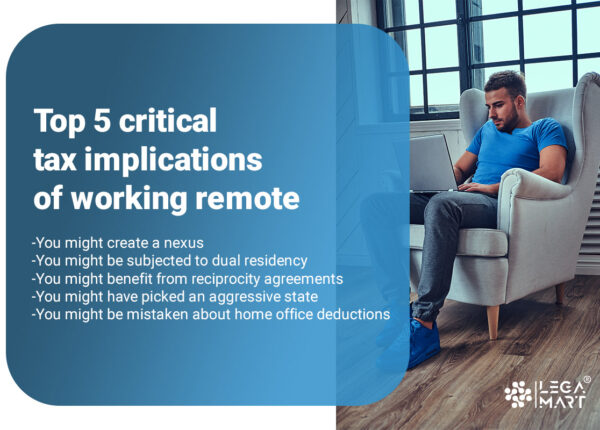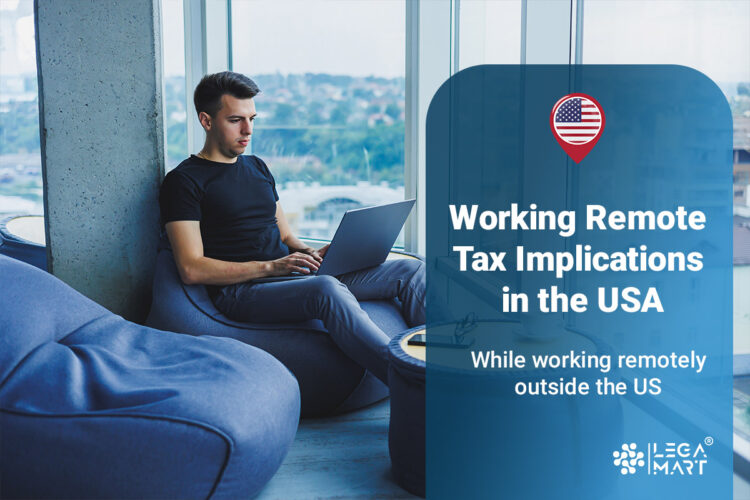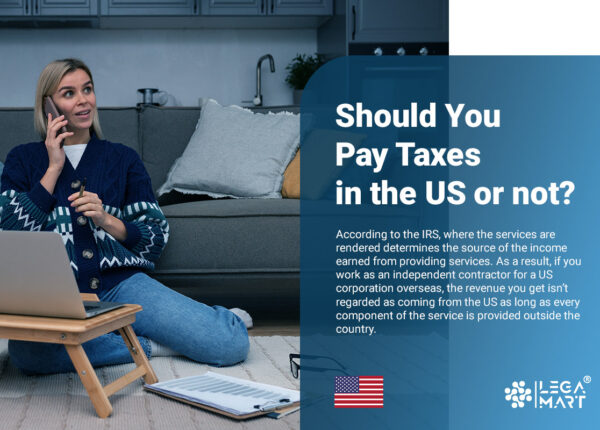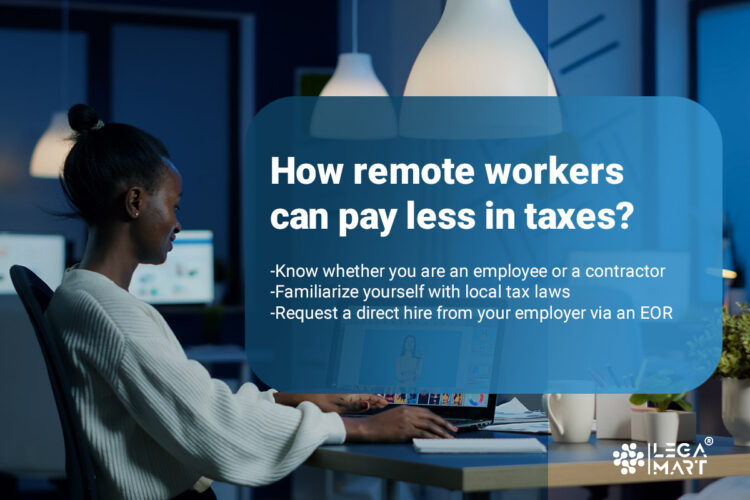- Introduction
- Top 5 critical tax implications of working remote
- Working Remote Tax Implications in the USA(while working remotely from the US)
- Working Remote Tax Implications in the USA(While working remotely outside the US)
- Paying taxes while working for a US company in Europe
- Should you pay taxes in the US or not?
- Double taxation agreements
- Factors impacting remote work taxes in the US
- How remote workers can pay less in taxes?
- Conclusion
- Frequently Asked Questions (FAQs)
Introduction
Due to increase in foreign transactions, countries have become more stringent with employees that work remotely resulting which they have to working remote tax implications in the US. The freedom of working from anywhere comes with obligations, just like other benefits. Even while taxes for remote employees are typically not more complicated than those for office workers, most tax education resources are geared toward those who operate in conventional settings. People who travel or work from home may lack access to the required information. This information on working remote tax implications in the USA might assist you in maintaining compliance if you operate remotely or have employees that do.
Important tax concepts for remote and hybrid workers
The following are some important concepts related to tax which can help you make more informed decisions in the USA:
- Each state makes their own tax rules – You become a state resident for tax purposes if you live in the state for a certain period of time, which most commonly is half a year or 183 days. Each state makes its own tax rate, residency rules, and form requirements to be filled. Usually, remote workers moving from a no-income-tax state, such as Alaska, Florida, Nevada, South Dakota, Tennessee, Texas, Washington, or Wyoming, to a state that taxes income will see the largest difference in their taxes if they don’t adjust their withholdings correctly.
- Living in one state and working in another could lead to double taxation – Double taxation is when you end up paying taxes on your income twice. Someone working remotely from abroad may be liable to pay taxes at home as well as in the host country, depending on the country, visa, and the presence of a local bank account. Fortunately, for remote workers in the USA, a 2015 Supreme Court ruling has already forbidden the application of double taxation by states on the same income. This means that while it is possible for you to be taxed twice, you can simply ask for a refund of that tax.
- Discover whether your state has reciprocal tax agreements – there are some states which have executed reciprocal agreements, hence allowing workers to travel to neighboring states for work without having to pay taxes there. While double taxation is forbidden, those who work and live in separate states may be required to file separate state returns. This is where the reciprocal agreements make it easier for employees by letting the employer to settle taxes on their behalf. So, for states having reciprocal agreements, workers are required to submit a form to their employer, who then files taxes on their behalf.
- Convenience of employee rule might be equivalent to twice the tax obligations – The forbiddance of double taxation is only allowed in certain conditions. For remote workers, it is only under the convenience of the employer rule. Therefore, to avoid double taxation, remote workers are required to prove that their employer has directed them to work out of state for its convenience. Some common ways of proving the same are:
- Your home office contains facilities/equipment necessary for the job that your employer hasn’t provided
- You use your home to meet with clients or conduct core business on a regular basis
- Your employer hasn’t provided you with a dedicated workspace or facilities at any of their locations
- Tax deductions unique to remote workers – Earlier, employees working from home were allowed to claim home office deductions while filing their taxes. However, after the application of the Tax Cuts and Jobs Act of 2018, this is no longer the case. However, freelancers and self-employed people having a dedicated home office are still allowed to claim home office deduction. W2 employees (individual formally employed by a company/organization in the USA, and who receives a W-2 tax form each year for reporting their income and taxes withheld) with side hustles may also be allowed to claim home office deduction only if the space, equipment, and supplies of the home office are used exclusively for that purpose. Some other deductions available to W2 employees are:
- For those required to travel for work, mileage and travel expenses are deductible if they are not reimbursed by the employer.
- Work-from-home teachers are also eligible for a $250 deduction to cover computer equipment and teaching supplies.
Top 5 critical tax implications of working remote

Some of the critical tax implications are:
- You might create a nexus. Considering that the employee is working from home from another state other than the employer’s home state, it might lead to a situation where the employer is subjected to taxation due to creating a nexus through the employee. While this might not be detrimental to the employer, it must be thought about, especially if it is a small company or if the employer is not aware of the exact location of the employee. Larger companies, however, have tax relationships with states other than their home state, so they do not face many problems.
- You might be subjected to dual residency. This might come into play when you report a move to the IRS, which might subject you to taxation for different portions of the calendar year based on your location. Therefore, if you lived in California for January to March and then moved to New York after that, you might be subjected to taxation in 2 different states, depending upon the period of stay. While this may cause many problems for you, if your location within the US is unclear, it could result in multiple states trying for their right to tax, eventually leading to double taxation. Therefore, remain clear about your location, both with the IRS and the employer.
- You might benefit from reciprocity agreements. Reciprocity agreements are agreements wherein residents of a state are allowed to work in a neighbouring state without having an obligation to file non-resident tax returns. This can result in the offer of a tax credit, depending on the state you belong to. For example, if you are a Pennsylvania resident but work remotely for a New Jersey company, you can submit an exemption to your employer in New Jersey, which ensures that your tax withholding is done for Pennsylvania. This means you can avoid filing a non-resident tax return for New Jersey. Therefore, this can be a perk depending on the states you live and work in.
- You might have picked an aggressive state. While some states prefer offering relief against overtaxing businesses and individuals, especially during the pandemic, others have not been so helpful. For instance, Kentucky has held that the impact on taxpayers is considered case-by-case, and no uniform relief shall be presented to all taxpayers. The best way to understand how aggressive your state is by visiting your state’s official website and searching for resources for businesses and taxpayers. You may also directly contact the state office to obtain more information.
- You might be mistaken about home office deductions. Taxation can be confusing when determining whether you qualify for certain home office deductions. While small business owners and freelancers have traditionally been eligible for relief, it doesn’t mean the benefit shall be made available to everyone. Mostly, if you are an employee of a company, you do not qualify for such deductions due to the Tax Cuts and Job Act of 2017. This means remote employees cannot benefit from deductions for insurance, repairs, utilities, and others.
Working Remote Tax Implications in the USA(while working remotely from the US)
Employees typically file state and federal taxes in the US. US employees pay taxes at the federal level based on where they work, not where their employers are based.
Working remote tax implications in the USA, as well as State taxes, are harder to understand. For instance, a worker who resides in Washington and works remotely for a California-based business can do so without paying California state taxes. However, remote employees who visit another state and do business there might be required to submit a non-resident state tax return. Remote workers are exempt from filing nonresident state tax returns unless they physically travel to another state and work there.
A reciprocity agreement may shield employees from state taxes.
There isn’t a state income tax in every state. In Alaska, Florida, Nevada, New Hampshire, South Dakota, Tennessee, Texas, Washington, and Wyoming, employees were exempt from state taxes in 2020. Texas’ state constitution expressly precludes the establishment of a state income tax. These states only require federal tax returns to be filed for remote workers who don’t perform employment in other states.
Physical location continues to be the deciding factor for which taxes employees in the US pay. Employers must carry out their obligations to withhold state taxes from personnel hired outside their home states on a state-by-state basis.
Working Remote Tax Implications in the USA(While working remotely outside the US)

Every nation in the globe has its unique set of tax laws. It would be as futile as trying to count the sand grains on a seashore to attempt to encapsulate international tax regulations in a few phrases. Let’s focus on tax obligations for remote workers who reside outside of the United States but are employed by American businesses for the time being.
Non-citizens who work for companies with US headquarters but reside abroad are not subject to US taxation. While you might have to fill out some paperwork if you’re an American working abroad, you typically just have to pay taxes in the nation where you reside and work. High earners who work abroad and make over $100,000 annually may still be subject to tax implications in the USA. Americans working abroad are required prepare to file tax returns, even with no debt.
American businesses cannot directly hire workers from other nations. A US corporation must either go through the drawn-out and challenging process of setting up its local legal entity (which can take months and cost thousands of dollars) or hire the employee via an employer of record or EOR, like Remote, to hire a person who lives abroad.
Independent contractors outside the United States must keep in mind to set aside funds for their taxes. In general, employers don’t deduct taxes from contractor wages or pay taxes to the government on their behalf. Contractors should examine local regulations for precise tax rates and money-saving advice because tax rates for contractors vary from country to country.
Independent contractors and taxes
Professionals that work independently sell their services to customers, typically businesses. They usually work for themselves or run a small business, and you can hire them on a project-by-project basis or for a set amount of time.
According to the IRS, a person is an independent contractor in the US “if the payer has the power to control or direct only the product of the job and not what will be done and how it will be done.”
It’s simple to pay taxes as a contractor. Independent contractors pay taxes on their own. It depends on where you live and where your independent contractor business is registered. You must pay income and self-employment taxes in the jurisdiction where your business is registered and where you spend most of the year living.
You will therefore pay taxes in the jurisdiction where your commercial activity is registered. Finally, to confirm that the job is lawful, a contractor must only submit a few forms to the US government and the local government. As a result, your organization need not worry about where and how to file your payroll taxes. Contractors are exclusively responsible for filing self-employment tax returns. Consequently, being a contractor is ideal if you’re seeking remote employment. In this method, getting hired will be more straightforward.
Paying taxes while working for a US company in Europe
The taxation system of most EU countries is similar, and therefore, remote workers can move from one EU country to another while working for a US Company. The general EU rule is that you are a tax resident when you spend 183 days in one country. Therefore, when you spend over 183 days, you need to file your tax returns and pay your taxes in a specific state. In case you stay for less than 183 days, the individual is only taxed on the income they earn in that country.
Here, since you are working remotely within the jurisdiction of the EU, you can be held liable for taxes within the EU. Therefore, if you do not wish to pay taxes on your income for the first six months, you prefer keeping a residency in any other state (or the US itself). Once 183 days have passed, you pay taxes on your income.
Further, according to EU law, you are also liable to pay social security taxes once you have stayed and worked remotely from within the jurisdiction of the EU for three months or more.
Should you pay taxes in the US or not?

We should examine further information to decide whether or not you should pay taxes in the US. According to the IRS, where the services are rendered determines the source of the income earned from providing services. As a result, if you work as an independent contractor for a US corporation overseas, the revenue you get isn’t regarded as coming from the US as long as every component of the service is provided outside the country.
Due to the fact that a contractor doesn’t pay taxes in the US, a US corporation doesn’t process their payroll there. However, to avoid paying US taxes when the foreign independent contractor completes the portion of their job here, the following requirements must be met:
- The contractor was in the country for less than 90 days in a tax year.
- The contractor is not paid $3,000 in total.
- The contractor pays for work for a company or office abroad.
A US firm is exempt from reporting or withholding taxes in the US if all conditions are satisfied.
Double taxation agreements
Different double taxation remedies are available to those who work for US firms, preventing them from paying income taxes twice. Taxation agreements can make paying taxes easier for people who work for US companies while residing abroad.
You won’t pay taxes twice because most nations have established tax treaties with one another. For instance, as a US person working overseas for a US corporation, you will primarily be responsible for paying taxes in your home nation. If you are an American, the remaining amount will be applied to your debts in the US.
Factors impacting remote work taxes in the US
Various factors are capable of affecting remote work taxes in the US:
- Duration. The location of the remote worker shall affect the tax liability of the employer and the employee. 43 of the 50 states in the US (apart from Alaska, Florida, Nevada, South Dakota, Tennessee, Texas and Wyoming), a personal income tax return is expected to be filed once you have covered a specific number of days.
- Location. A statutory test exists in every state to determine whether a person is a permanent or temporary resident. The test mainly involves considering the amount of time spent in the state and the domicile or permanent home of the individual. As previously discussed, a remote employee is capable of triggering a nexus for the employer.
- Reason. Taxes in some states depend on the factor of why a person is working remotely in another state. The convenience of the employer rule is adhered to by multiple states, including Arkansas, Connecticut, Delaware, Massachusetts, Nebraska, New York, and Pennsylvania. This rule allows the state to tax a person where they work and their employer’s office, with no tax credit.
How remote workers can pay less in taxes?

There are various ways for remote employees inside and outside the United States to reduce their tax obligations. Here are some recommendations:
- Know whether you are an employee or a contractor
If you haven’t made the nature of a relationship explicit in writing, don’t presume it. Find out if you are an employee or a contractor by consulting your local laws and contracts. When an employer realizes they have misclassified a worker, they must immediately fix the problem.
- Familiarize yourself with local tax laws
Various income tax rules and regulations exist in different nations, states, regions, and localities. Find out about local regulations before you relocate and file your taxes there. Employees may discover that working with a tax expert is frequently less expensive and more straightforward than navigating new areas. Employers employing overseas contractors and workers often require the support of a PEO or an EOR to maintain compliance.
- Request a direct hire from your employer via an EOR
People who operate as contractors or employees outside of the United States don’t always receive the assistance they require. Payroll, benefits, taxes, and compliance can all be delegated to an EOR like Remote, allowing businesses to guarantee compliance with local labour and tax laws while improving the working environment for their multinational staff.
Conclusion
As you can see, there are numerous options for working remotely for a US corporation. Additionally, US citizens who live and work abroad can save money on taxes.
The income exclusion provided in the US can benefit Americans who reside and work overseas for US or international businesses. Although it’s the overseas earned income exclusion, it can also be generated domestically in the US. Therefore, you can eliminate your working remote tax implications in the USA by utilizing this exclusion.
In the US, individuals can deduct up to $108,700 from their taxable income in 2021. However, for US citizens to be eligible for the foreign-earned income exclusion, they must satisfy one of the IRS tests. These tests demonstrate that you do reside overseas.
They will verify your presence when you must prove that you have permanent residence in another country. In addition, on the physical presence test, you must demonstrate that you have spent a minimum of 330 consecutive days outside the US in the previous 365 days.
If you are interested in learning more about the important remote tax implications that may affect you, we encourage you to schedule an appointment with our professionals!
Frequently Asked Questions (FAQs)
Do remote workers pay taxes in the work country?
They may be expected to pay taxes in the work country unless they live in a country implementing tax incentives or have a reciprocal agreement with their own country. Further, it is important to note that any remote worker living more than 183 days in a different will be obligated to pay taxes in that country.
What are the factors impacting double taxation for remote employees?
Some important factors related to double taxation are:
- The worker’s citizenship
- Their residence status in the destination country
- Their worker classification
- If they qualify for tax incentives
Uncover the steps and procedures for immigration to different nations, with a focus on Turkey to Norway and US to Portugal, in Legamart’s insightful articles.




